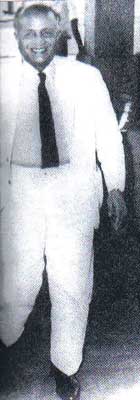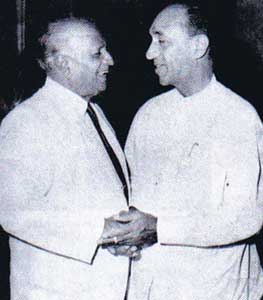A Marxist leader is born
 |
Dr. N. M. Perera, Finance Minister,
on Budget Day 1964 |
"My mother took pride in announcing to all her friends that I was a seven month baby. She chuckled with evident satisfaction that she nourished me into healthy bonny childhood under great difficulty. There were no doctors attending at the childbirth. Only the local midwife with her years of experience, which had made her an expert in her own way, was at hand. There were no weighing machines to weigh. I was a tiny, weeny baby so small and so fragile that I could not suck breast milk. For weeks, I was on a 'pankade' dipped in milk. I must have steadily increased in weight and grown up quite healthily, because mother never referred to any serious illness that afflicted me in these early days. I was thus the pre-maturely born fifth son of my parents."
This is the opening paragraph of the autobiography written by Nayakkarapathirage Martin Perera, known to everyone as Dr. N. M. Perera. He was born on June 5, 1905. Member of the State Council, political prisoner and jail breaker during the days of World War II, Member of Parliament and Finance Minister, he was also President, Board of Control for Cricket in Sri Lanka, having captained Ananda College at cricket.
 |
Dr. N. M. Perera with President
J. R. Jayewardene |
A founder of the first Marxist party, the Lanka Sama Samaja Party (LSSP) in 1935, he was a leading figure in the left and trade union movement for nearly five decades. His was a long legislative career starting in 1936 in the State Council having been elected to the Ruwanwella seat. He was a member of the Executive Committee on Labour, Industry and Commerce. As leader of the LSSP and the party winning the second largest number of seats(10 in a 101 member House of Representatives), he became the first Leader of the Opposition in the First Parliament (1947) when he retained the Ruwanwella seat.
Dr. Perera was Finance Minister twice – once in 1964 and then from 1972-75 in coalition governments led by the Sri Lanka Freedom Party.
He was continuously a Member of Parliament until 1977.
A BSc, DSc and PhD (London) of the London School of Economics, Dr. Perera was a pupil of the legendary Harold Laski.
He died on August 14, 1979. |
Unofficials in the majority
On June 5, 1921, a significant event took place in the constitutional development in Sri Lanka when the first meeting of an enlarged Legislative Council with the unofficial members being in the majority for the first time was held. Under the Constitution which was granted in 1920, the membership of the Council was increased to 37 with 14 official and 23 unofficial members.
The Legislative Council had started with 15 members consisting of nine officials and six unofficials. All were nominated by the government.
Up to half of the unofficial members could be Ceylonese and the Governor nominated one low country Ceylonese, one Burgher and one Tamil to the Council. The other three unofficial members were European planters or businessmen.
Over the years the numbers gradually increased and the pace of change quickened in the 1920s. Out of the 23 unofficial members who sat at the enlarged Council in June 1921, the majority (16 in number) were elected. The powers of the Council were by no means formidable. Only the Governor could initiate money bills. The Governor also had the power to stop the proceedings of the Council when he considered any legislative measure, "affected the safety and tranquility of the Island."
He could also declare the passing of many measure if it was "of paramount importance to the public interest" and in such a case it could be carried by a majority of the votes of the officials. |


